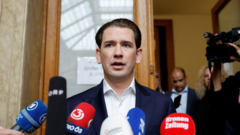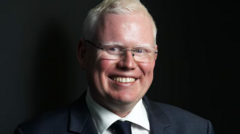The former political celebrity, once hailed as a rising star of European conservatism, sheds light on political accountability and legal interpretations in Austria.
Sebastian Kurz's Conviction Overturned: A Turning Point in Austrian Politics?

Sebastian Kurz's Conviction Overturned: A Turning Point in Austrian Politics?
Austrian ex-chancellor Sebastian Kurz has had his perjury conviction overturned, opening discussions about potential political reelections amid ongoing corruption probes.
Austria's former chancellor Sebastian Kurz has successfully appealed against a conviction for giving false testimony to a parliamentary inquiry, leading the court to overturn the previous ruling that had imposed an eight-month suspended prison sentence. Kurz, who was once viewed as a prominent figure among Europe’s conservative leaders, resigned from his chancellorship in 2021 and withdrew from the political scene amid various legal accusations. This recent acquittal may pave the way for his return to politics, although he still confronts ongoing investigations related to separate corruption allegations.
In 2022, Kurz was convicted of perjury regarding his testimony about his involvement in the selection processes for executives at a newly formed state holding company. His defense maintained that he had only been “informed” rather than actively involved. The initial ruling deemed his statements misleading, but Kurz argued that judicial bias played a part in his conviction. The appeal court's decision to acquit Kurz indicated that the evidence did not satisfy the legal standards for false testimony.
After the ruling, Kurz addressed the public, framing the verdict as a collapse of years of accusations that he faced. "There have been numerous court hearings – a huge amount of confrontation with these accusations. You have all witnessed how much this has been celebrated and that it has now all collapsed," he stated outside the court.
While Kurz maintains his innocence regarding the corruption allegations involving misuse of public funds for favorable media coverage and manipulated polling results, prosecutors are still deliberating on whether to bring charges. Despite this, he has remained reticent about plans to re-enter the political fray.
Since stepping down, Kurz has pursued various business endeavors, including co-founding the cybersecurity firm Dream in 2023, alongside notable partners from the tech industry. During his previous tenure, Kurz had led the Austrian People's Party to considerable electoral successes, particularly focusing on stringent immigration policies.
The current political landscape in Austria sees the People's Party governing alongside the Social Democrats and a liberal party following recent elections. The far-right Freedom Party emerged from the last elections as a significant player, reflecting public discontent over issues related to the economy and immigration, despite their inability to form a government. As Austria navigates these complex political dynamics, Kurz's future—both in terms of legal challenges and potential political resurgence—remains uncertain.



















